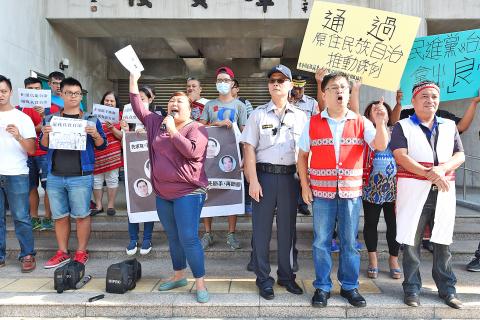Proposed self-government legislation for Aboriginal groups drew competing protests from Aboriginal activists yesterday.
Protesters from the Indigenous Youth Front faced off against a smaller group of older Aboriginal representatives led by a Chinese Nationalist Party (KMT) county councilor outside the Legislative Yuan.
The demonstrators shouted competing slogans before laying out their contrasting positions on the adequacy of the “Indigenous Self-Rule Temporary Regulations” (原住民族自治暫行條例) under consideration by the legislature.

Photo: Liao Chen-huei, Taipei Times
Indigenous Youth Front protesters said that the bill would only allow for “bird cage” self-government, which they described as “crippled” and “fake.”
“This is not self-government — it is the functions of the Council of Indigenous Peoples being outsourced to villages,” Front member Savungaz Valincinan said, criticizing the law’s focus on culture and education, while failing to protect hunting rights and allow Aborigines to draft their own criminal and civil law.
“What self-rule should look like should be discussed and determined by villages,” she said. “Right now, the executive branch has pegged us into their pre-prepared frame.”
Valincinan said that the representative electoral system of government prescribed by the act would not square with the customs of all Aborigines, citing the example of the Amis, who she said traditionally divide different tribal responsibilities based on age.
In contrast to the act’s emphasis on adversarial majority rule, many Aboriginal communities favor a “collegial system” focusing on achieving an absolute consensus on major decisions, she said.
Front member Juan Chun-ta (阮俊達) said that the funding provided under the act was inadequate.
The budget for the “self-governments” to be established would be allocated directly by the Executive Yuan for the next 10 years, after which a “Self-Government Fund” worth NT$10 billion (US$306 million) would be established to fund future expenses.
“That figure is extremely small,” he said. “There is no way you can do much with that amount of revenue.”
He said that the annual budget of the Council of Indigenous Peoples is more than NT$8 billion, while the yearly budget of Chiayi City is NT$11 billion, even though its population is less than half of the nation’s Aborigines.
A group of older protesters led by KMT Hsinchu County Councilor Obay a Awi (趙一先) said that the bill would be a beginning that could lay the foundation for more substantial self-government.
Obay said that the bill was intended to help Aborigines learn the “basic motions” of self-government, rather than establishing the final framework.
He said that it would provide a source of legal authority for existing Aboriginal assemblies, while allowing their members to focus full time on drafting and discussing permanent self-government proposals.
He added that while he did not disagree with the competing protesters’ desire for broader self-government than that contained in the draft bill, he felt that their opposition was not “prudent” because there is no guarantee that a more far-reaching bill would pass if the current one were rejected.

An essay competition jointly organized by a local writing society and a publisher affiliated with the Chinese Communist Party (CCP) might have contravened the Act Governing Relations Between the People of the Taiwan Area and the Mainland Area (臺灣地區與大陸地區人民關係條例), the Mainland Affairs Council (MAC) said on Thursday. “In this case, the partner organization is clearly an agency under the CCP’s Fujian Provincial Committee,” MAC Deputy Minister and spokesperson Liang Wen-chieh (梁文傑) said at a news briefing in Taipei. “It also involves bringing Taiwanese students to China with all-expenses-paid arrangements to attend award ceremonies and camps,” Liang said. Those two “characteristics” are typically sufficient

A magnitude 5.9 earthquake that struck about 33km off the coast of Hualien City was the "main shock" in a series of quakes in the area, with aftershocks expected over the next three days, the Central Weather Administration (CWA) said yesterday. Prior to the magnitude 5.9 quake shaking most of Taiwan at 6:53pm yesterday, six other earthquakes stronger than a magnitude of 4, starting with a magnitude 5.5 quake at 6:09pm, occurred in the area. CWA Seismological Center Director Wu Chien-fu (吳健富) confirmed that the quakes were all part of the same series and that the magnitude 5.5 temblor was

The brilliant blue waters, thick foliage and bucolic atmosphere on this seemingly idyllic archipelago deep in the Pacific Ocean belie the key role it now plays in a titanic geopolitical struggle. Palau is again on the front line as China, and the US and its allies prepare their forces in an intensifying contest for control over the Asia-Pacific region. The democratic nation of just 17,000 people hosts US-controlled airstrips and soon-to-be-completed radar installations that the US military describes as “critical” to monitoring vast swathes of water and airspace. It is also a key piece of the second island chain, a string of

The Central Weather Administration has issued a heat alert for southeastern Taiwan, warning of temperatures as high as 36°C today, while alerting some coastal areas of strong winds later in the day. Kaohsiung’s Neimen District (內門) and Pingtung County’s Neipu Township (內埔) are under an orange heat alert, which warns of temperatures as high as 36°C for three consecutive days, the CWA said, citing southwest winds. The heat would also extend to Tainan’s Nansi (楠西) and Yujing (玉井) districts, as well as Pingtung’s Gaoshu (高樹), Yanpu (鹽埔) and Majia (瑪家) townships, it said, forecasting highs of up to 36°C in those areas